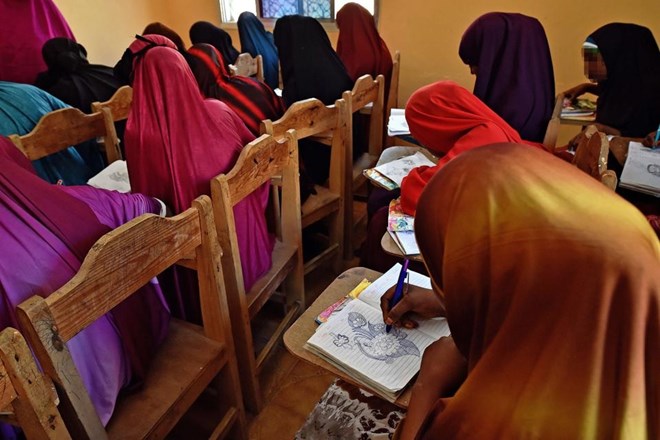
Saturday October 9, 2021

Young women take part in an art lesson at the Elman Peace and Human Rights Centre in Mogadishu on March 24, 2015, where survivors of sexual violence can find refuge, medical care and support. Sexual violence is widespread in Somalia and rarely prosecuted. If anyone is punished at all it is often the victim, not the perpetrator. AFP PHOTO / CARL DE SOUZA (Photo credit: CARL DE SOUZA/AFP via Getty Images) AFP VIA GETTY IMAGES
In August 2021, the U.N. Special Representative on Sexual Violence in Conflict, Pramila Patten, and the U.N. Special Representative for Children and Armed Conflict, Virginia Gamba, warned about the alarming increase in sexual violence in Somalia and called upon all perpetrators to cease these violations.
According to two recent reports, the Report of the Secretary-General on Children and Armed Conflict and the Report of the Secretary-General on Sexual Violence in Conflict, 2020 has seen an almost 80% increase in cases of sexual violence in Somalia as compared to 2019. Among the cases, close to two-thirds reported rape, and the remaining cases included attempted rape, forced marriage, sexual harassment and sexual assault.
The United Nations Assistance Mission in Somalia verified cases of conflict-related sexual violence perpetrated against 400 girls, 12 women and 7 boys, primarily attributed to clan militias and Al-Shabaab. The number of cases of sexual violence attributed to Al-Shabaab has doubled. The Islamist militant group continues to use sexual violence and forced marriage against women and girls. The number of acts of violence by clan militia has almost tripled in 2020. Other actors implicated in the crimes were the Somali Police Force (in 16 cases), the Somali National Army (in 25 cases), the Jubbaland security forces (in nine cases) and Puntland forces (in five cases). Unfortunately, the majority of the perpetrators remain unidentified. Impunity for the crimes will only provide fertile ground for further crimes.
The U.N. identified protracted conflict, structural gender inequality and successive humanitarian crises in the country as the main reasons for the ever-growing issue of sexual violence in Somalia. As the U.N. added, “political tensions in the run-up to national elections, inter-communal clashes related to land-based disputes, and a surge in extremist militant group Al-Shabaab’s activities, which intensified during the Covid-19 pandemic.”
While instances of sexual violence in Somalia is on the rise, the Covid-19-related movement restrictions also mean that survivors of such atrocities have limited access to assistance, including basic services. Among others, “a paucity of personal protective equipment for shelter workers impaired their ability to admit survivors of gender-based violence.” Furthermore, some services usually provided remotely, such as psychosocial support, were severely affected by funding shortfalls. Lastly, as reported by the U.N., “judicial services, including the adjudication of sexual violence cases, were temporarily suspended.”
The U.N. Special Representatives have urged the Government of Somalia to take concrete measures to prevent sexual violence against women and children. They further called upon the Government to swiftly adopt a new national action plan on ending sexual violence in conflict.
Somalia is only one example of a country where rape and sexual violence is common. The situation in Somalia is yet another reason why we should work towards comprehensive actions to address sexual violence. In this spirit, Dr Denis Mukwege, Nobel Peace Prize laureate, announced a new initiative, the Red Line Initiative, which aims to strike a red line through sexual violence in conflict. The initiative will strive to create a legally binding international instrument to “evoke a clear moral rejection and international outcry when sexual violence is used as a weapon of war; ensure a more robust and timely response by states in line with their international obligations; and establish clear legal obligations that increase the costs not only for individuals but also for governments if they fail to act.” No State could object to such a proposal without becoming complicit in a crime that has no end.